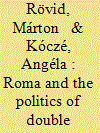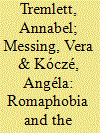| Srl | Item |
| 1 |
ID:
157077


|
|
|
|
|
| Summary/Abstract |
The article analyses the politics of ‘double discourse’ in relation to Roma that has evolved in contemporary neoliberal Europe. On the one hand, the double discourse promotes the integration, rights and equal opportunities of Roma, on the other, it denies recognition of, and ways to address, enduring structural violence and rising social insecurity. The article argues that the politics of ‘double discourse’, as a neoliberal approach towards Roma, is structured by two contradictory discourses that speak to different audiences, using duplicitous approaches to create anti-Roma consensus and maintain the critical difference and subordinated position of the racialised Romani populations in Europe. By studying the representation of Roma in the cases of so-called 'child theft' in Greece and Ireland, and in the recent ‘refugee crisis’, the paper identifies and discusses three dimensions of contemporary neoliberal double discourse: racialised de-Europeanisation, neoliberal undeservingness and (dis)articulation of citizenship.
|
|
|
|
|
|
|
|
|
|
|
|
|
|
|
|
| 2 |
ID:
157074


|
|
|
|
|
| Summary/Abstract |
This special issue of Identities, entitled ‘Romaphobia and the media’, examines entrenched and ongoing media coverage of Roma, Gypsy and Traveller people across Europe. The focus is on how the media problematises the Roma, how it constructs a ‘conceptual map’ about Roma people and what this tells us about the societies we live in. This special issue includes five academic articles all examining the constructions and stereotypes used in the media in various formats and European countries. After these academic articles, this special issue then deviates from the normal journal structure by including three commentary pieces from professionals from varying Roma backgrounds to give their views and experiences on how they tackle Romaphobia and the media. The inclusion of these commentary pieces are very powerful in offering a perspective of active interventions and resistance that we should not forget amidst the depressing continued circulation of racialised stereotypes.
|
|
|
|
|
|
|
|
|
|
|
|
|
|
|
|